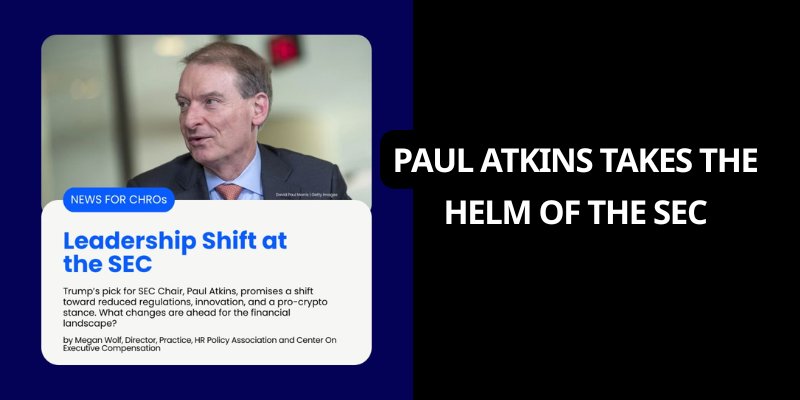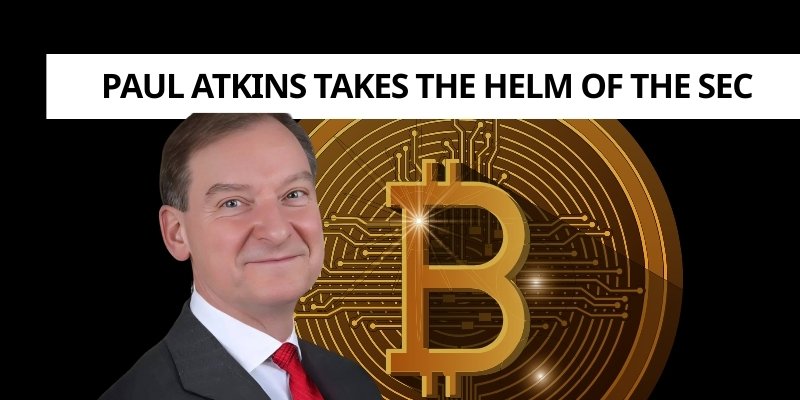Paul Atkins Becomes SEC Chairman: What It Means for the Future of Crypto Regulation
On April 9, 2025, Paul Atkins was confirmed by the U.S. Senate as the new Chairman of the Securities and Exchange Commission (SEC), with a vote of 52–44. His confirmation signals the beginning of a new era for cryptocurrency regulation in the United States—one marked by a shift toward clarity, consistency, and transparency. As the crypto industry continues to navigate a rapidly evolving landscape, many are hopeful that Atkins’ leadership will bring much-needed stability and direction.
Contents
The Need for Clearer Crypto Regulation
The cryptocurrency sector in the U.S. has long struggled with regulatory uncertainty. Under the leadership of Gary Gensler, who left the SEC in January 2025, the agency aggressively pursued legal action against major crypto platforms such as Coinbase, Binance, and Ripple. These actions, coupled with policies like the controversial SAB 121 regulation, were seen as overly burdensome by many in the crypto community. As a result, the market has been calling for a more structured and predictable regulatory framework.
Paul Atkins’ appointment comes at a crucial time, as the crypto industry is looking for a clear set of guidelines that can provide legal certainty for businesses and investors. With a background in both financial regulation and the crypto space, Atkins is seen as the ideal figure to steer the SEC towards a more balanced approach—one that fosters innovation while protecting investors.

Atkins’ Background: A Strong Advocate for Innovation
Paul Atkins is no stranger to regulatory roles. From 2002 to 2008, he served as an SEC Commissioner under President George W. Bush, where he championed transparency, regulatory consistency, and cost-benefit analysis. His tenure was marked by efforts to improve the clarity of financial regulations and reduce unnecessary red tape. These principles of clear communication and measured policy are expected to guide his approach to crypto regulation.
In addition to his government service, Atkins has been deeply involved in the blockchain and cryptocurrency sectors. From 2017 to 2024, he co-chaired the Token Alliance, an organization that advocated for regulatory clarity and innovation in the crypto space. Atkins also founded Patomak Global Partners in 2009, a financial consulting firm that has worked with a range of clients, including crypto exchanges, traditional banks, and decentralized finance (DeFi) protocols.
Atkins’ personal financial portfolio also includes significant holdings in cryptocurrency—around $6 million—further aligning his interests with the growth and success of the digital asset sector. While this has raised concerns among some critics, his background gives him a unique understanding of the complexities and potential of the crypto market.
What Can the Crypto Community Expect Under Atkins’ Leadership?
The cryptocurrency community has expressed high hopes for Atkins’ leadership at the SEC. His tenure is expected to bring several key changes and initiatives that will impact both crypto businesses and investors in the U.S.:
-
Clearer Regulations for Digital Assets: One of the most pressing issues for the crypto industry is the lack of a consistent framework to determine which digital assets are classified as securities. Atkins has the opportunity to establish a unified “Howey Test” for crypto tokens, providing clarity and reducing the risk of litigation for crypto firms. This clarity would be invaluable to companies that have been forced to operate in a gray area, often without clear guidance from the SEC.
-
Investor Protection Without Stifling Innovation: While ensuring the protection of investors remains a priority, Atkins is likely to take a more balanced approach compared to his predecessor, Gary Gensler. Under Gensler’s leadership, the SEC’s actions were often seen as a threat to the growth of the industry. Atkins is expected to create policies that protect retail investors while allowing for continued innovation in the crypto space.
-
Collaboration with Industry Stakeholders: Atkins’ previous experience in the crypto sector and his connections with industry leaders will likely result in more open dialogue between the SEC and the crypto industry. By working closely with crypto firms, developers, and other stakeholders, Atkins can help create regulations that are more in tune with the needs and realities of the market, while still ensuring robust consumer protection.
-
Global Competitiveness: With countries around the world working to develop their own crypto regulatory frameworks, the U.S. faces increasing competition in the race to establish clear, business-friendly crypto regulations. Atkins’ leadership could help position the U.S. as a global leader in cryptocurrency and blockchain innovation, ensuring that American companies remain competitive on the world stage.
The Path Ahead: What to Watch for Under Atkins’ SEC
As Paul Atkins assumes leadership of the SEC, several key regulatory issues are likely to dominate the agenda:
-
Clarity on Security Classification: Whether or not cryptocurrencies are classified as securities remains one of the most contentious issues in the sector. A clear and definitive test for determining when a token is considered a security will be critical for establishing a fair regulatory framework.
-
The Future of Enforcement Actions: While Atkins has signaled that the SEC will take a more measured approach than under Gensler, the agency is still likely to pursue enforcement actions against bad actors in the crypto space. However, the focus may shift towards transparency and compliance rather than aggressive litigation.
-
DeFi and NFTs: As decentralized finance (DeFi) platforms and non-fungible tokens (NFTs) continue to grow, the SEC will need to address regulatory gaps in these emerging areas. Atkins will likely work to develop rules that provide clarity for DeFi protocols and NFT marketplaces, without stifling innovation.
-
Cross-Border Cooperation: Given the global nature of the crypto market, Atkins’ SEC will likely engage in greater international cooperation with regulatory bodies from other countries. This will help align U.S. regulations with global standards and ensure that the U.S. remains competitive in the digital asset space.

Challenges and Controversies
Atkins’ appointment, while largely welcomed by the crypto industry, has not been without controversy. His financial ties to the crypto industry have raised concerns about potential conflicts of interest. Additionally, some lawmakers, particularly from the Democratic party, have voiced opposition to his appointment due to his past advocacy for less restrictive crypto policies. Senators like Elizabeth Warren have raised questions about whether Atkins’ background could lead to regulatory capture or leniency towards industry players.
Nevertheless, Atkins’ confirmation and subsequent actions will be closely watched. The balance he strikes between innovation and investor protection will determine the future of the U.S. crypto market.
Conclusion
Paul Atkins’ appointment as SEC Chairman represents a pivotal moment for the future of cryptocurrency regulation in the U.S. With a wealth of experience in both traditional finance and digital assets, Atkins is well-positioned to guide the SEC towards a more transparent, consistent, and innovation-friendly approach to regulating cryptocurrencies. As the industry continues to grow and mature, the clarity and stability provided by Atkins’ leadership could play a crucial role in shaping the long-term success of the U.S. crypto market.
For the crypto community, Atkins’ leadership is seen as an opportunity to move beyond the regulatory uncertainty that has plagued the sector. By establishing clear rules, promoting investor protection, and fostering innovation, Atkins has the potential to create a thriving regulatory environment that benefits both the industry and consumers alike.